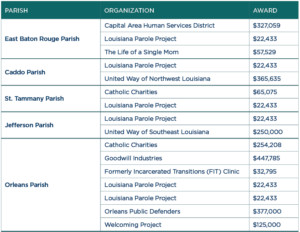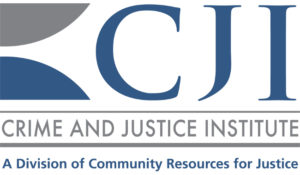Click here for a downloadable version
Overview
One year into Louisiana’s implementation of landmark criminal justice reforms, the state no longer leads the nation in imprisonment and has earmarked millions of dollars in savings for reinvestment into programs that reduce recidivism and support crime victims.
In June 2017, Louisiana Governor John Bel Edwards signed into law a bipartisan package of 10 bills aimed at protecting public safety and making better use of correctional dollars. At the time, Louisiana’s incarceration rate was nearly twice the national average, costing the state almost $700 million in corrections spending annually. Despite this enormous public investment, one in three inmates released from prison was re-incarcerated within three years.
The policy package was the result of months of study by the Louisiana Justice Reinvestment Task Force, an inter-branch, bipartisan panel of experts. The Task Force found that Louisiana had been sending a growing share of people to prison rather than prison alternatives,1 yet leading criminologists have found that incarceration does not reduce recidivism more than non-custodial sanctions.2 This trend was partly due to legislative restrictions on the use of community supervision, treatment, or other approaches such as specialty courts. During this time of more prison and less use of alternatives, the recidivism rate remained unchanged.
The new laws put in place policies designed to steer people convicted of less serious crimes away from prison, strengthen alternatives to incarceration, reduce prison terms for those who can be safely supervised in the community, and remove barriers to successful reentry.
Louisiana sought support from the Department of Justice’s Bureau of Justice Assistance (BJA) to implement the new policies, with the Crime and Justice Institute partnering with state leaders to carefully put the policies into action. Louisiana has already begun to see significant results, including a drop in the prison population and larger-than-expected savings that will support state agencies and local partners in continued successful rollout.
Background
For more than two decades, Louisiana had the highest incarceration rate in the nation, fueled partly by stiff mandatory sentencing laws and restrictive parole practices, including for lower-level, nonviolent offenders. By 2017, state spending on corrections was approaching $700 million, yet this increased investment was not reducing recidivism.
In 2016, Louisiana leaders requested help through BJA’s Justice Reinvestment Initiative (JRI) to develop solutions that would ease the strain on state budgets while reducing recidivism. Through the JRI process, the Louisiana Justice Reinvestment Task Force recommended a package of policy recommendations that became the basis for the 2017 legislation, which stands as the most comprehensive criminal justice improvement effort in the state’s history.
According to data from the Department of Public Safety and Corrections, the makeup of Louisiana’s prison population has shifted to make smarter use of the limited resources. The number of people imprisoned for nonviolent offenses has dropped by 20 percent, opening up prison space and resources to focus more on individuals who pose the largest threat to the public. As a result, a majority of Louisiana’s prison population (52 percent, as of the first quarter of 2018) is now incarcerated for a violent offense. The overall prison population decreased 7.6 percent since implementation of the policies began.
I’m extremely proud of how we’re making a huge difference in Louisiana today and for future generations through the passage and implementation of these historic criminal justice reforms. We’re saving the state millions of dollars and reinvesting the savings into programs that reduce recidivism, support victims, and improve public safety. In addition, Louisiana no longer has the nation’s highest incarceration rate, and we’re moving in the right direction to make Louisiana a safer place.” —Department of Public Safety and Corrections Secretary James M. Le Blanc
Reinvesting JRI Savings
These shifts in the correctional population resulted in significant savings, 70 percent of which is slated for reinvestment into programs that reduce recidivism and support victims of crime; this allocation, shown in the graph below, is a statutory requirement that resulted from the Justice Reinvestment effort.³
In October 2018, the Department of Public Safety and Corrections (DPS&C) reported a total savings of $12.2 million in the first year of implementation, double the original projected savings of $6.1 million. Of that amount, $8.5 million is going back into recidivism reduction and victim services.
Distribution of Reinvestment Dollars

Given the required statutory framework for reinvestment, Louisiana policymakers have made available the following amounts for the coming year:
- $4.27 million for targeted Department of Public Safety & Corrections investments
- $1.7 million for victim services grants
- $2.53 million in grants to community-based programs
Targeted Investments into Department of Public Safety & Corrections
The Department intends to use first-year reinvestment funding to support the following priorities:
- Increase programming for state inmates housed at local jails;
- Enhance and expand Regional Reentry Centers;
- Increase Probation and Parole staffing and Day Reporting Centers;
- Launch a Transitional Housing pilot program;
- Open a new Reception Center to conduct assessments for new inmates; and
- Expand Specialty Courts.
Grants to Victim Services
The reinvestment money for victim services will be allocated by the Louisiana Commission on Law Enforcement. The Commission plans to use first-year reinvestment funding to:
- Supplement the Crime Victims’ Reparations Fund;
- Establish a new Family Justice Center in East Baton Rouge Parish;
- Improve electronic notifications for victims by developing a system that will interface with all 64 parish clerks of court; and
- Provide funding to the Louisiana Bureau of Investigations for a dedicated forensics server for its Cyber Crimes Unit.
Grants to Community-based Programs
To distribute reinvestment funds earmarked for grants to community-based programs, DPS&C created a Community Incentive Grant Program and issued a Request for Proposals (RFP) to distribute the funds effectively and transparently.
The department sought proposals for programs or services to accomplish one or more of the following:
- Prioritize incarceration for serious and violent offenders by expanding alternatives to prison such as pretrial intervention and/or diversion programs;
- Reduce crime among those returning to the community by improving and expanding reentry resources such as employment and employment readiness, transportation, behavioral health care (mental health and substance use treatment), family reunification, education and/or vocational training, mentoring and peer support, and other wraparound services; and
- Improve community coordination of reentry resources.
For the first year of the Community Incentive Grant program, the department appropriated $2.5 million for nonprofit organizations in the five parishes that account for 40 percent of the state’s incarcerated population: East Baton Rouge, Caddo, St. Tammany, Jefferson, and Orleans. This first year of reinvestment will serve as a pilot, funding the development of innovative programs that can be expanded to additional parishes in future years.
At the end of October, the department announced awards to 11 nonprofits, some of which operate in multiple parishes. The organizations that received awards will provide a range of services including life skills, peer support, wraparound services, reentry programs, job training, behavioral health support, and legal services.4 With this funding, these organizations will expand their work and deliver programs to help individuals transition back to the community after incarceration.

A Solid Path Forward
Since passing the most significant criminal justice reform in state history, Louisiana has made meaningful progress in implementing new policies and practices designed to protect public safety and better utilize state corrections dollars.
Though implementation is a long process, the reforms have already had a dramatic impact, moving Louisiana out of its long-held top spot as the most incarcerated state in the nation and surpassing expectations for savings. By channeling $8.5 million in savings into innovative and evidence-based programs, Louisiana leaders are putting the state on a solid path for the positive impact of criminal justice reform to continue and expand.
The Crime and Justice Institute (CJI), a division of Community Resources for Justice, works to improve public safety and the delivery of justice by providing nonpartisan technical assistance, research, and other services to improve outcomes across the spectrum of the adult and juvenile justice systems, from policing and pretrial through reentry. CJI provides direct technical assistance, assessment, implementation, research, data analysis, training, facilitation, and more. We take pride in our ability to improve evidence-based practices in public safety agencies and gain organizational acceptance of those practices. We create realistic implementation plans, put them into practice, and evaluate their effectiveness to enhance the sustainability of policies, practices, and interventions.
This project was supported by Grant No. 2015-ZB-BX-K002 awarded by the Bureau of Justice Assistance. The Bureau of Justice Assistance is a component of the Department of Justice’s Office of Justice Programs, which also includes the Bureau of Justice Statistics, the National Institute of Justice, the Office of Juvenile Justice and Delinquency Prevention, the Office for Victims of Crime, and the SMART Office. Points of view or opinions in this document are those of the author and do not necessarily represent the official position or policies of the U.S. Department of Justice.
For more information, contact: Abigail Strait, Policy Specialist, Crime and Justice Institute, a division of Community Resources for Justice, Boston, MA | astrait@crj.org or 617-482-2520
